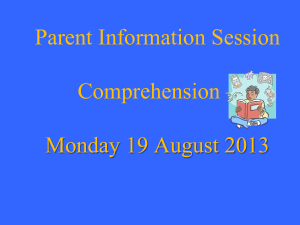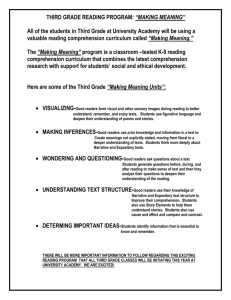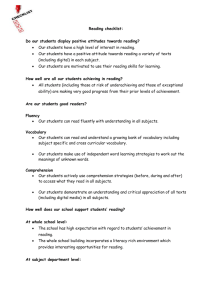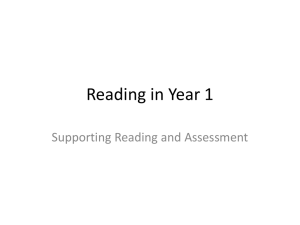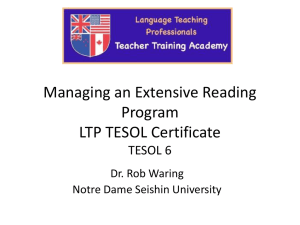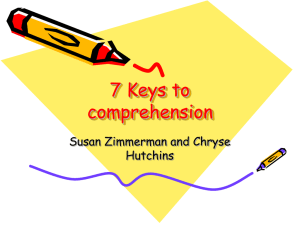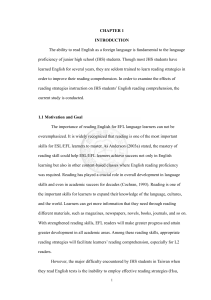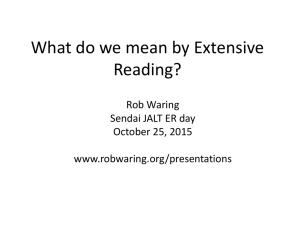Some-studies-intensive-rdg
advertisement
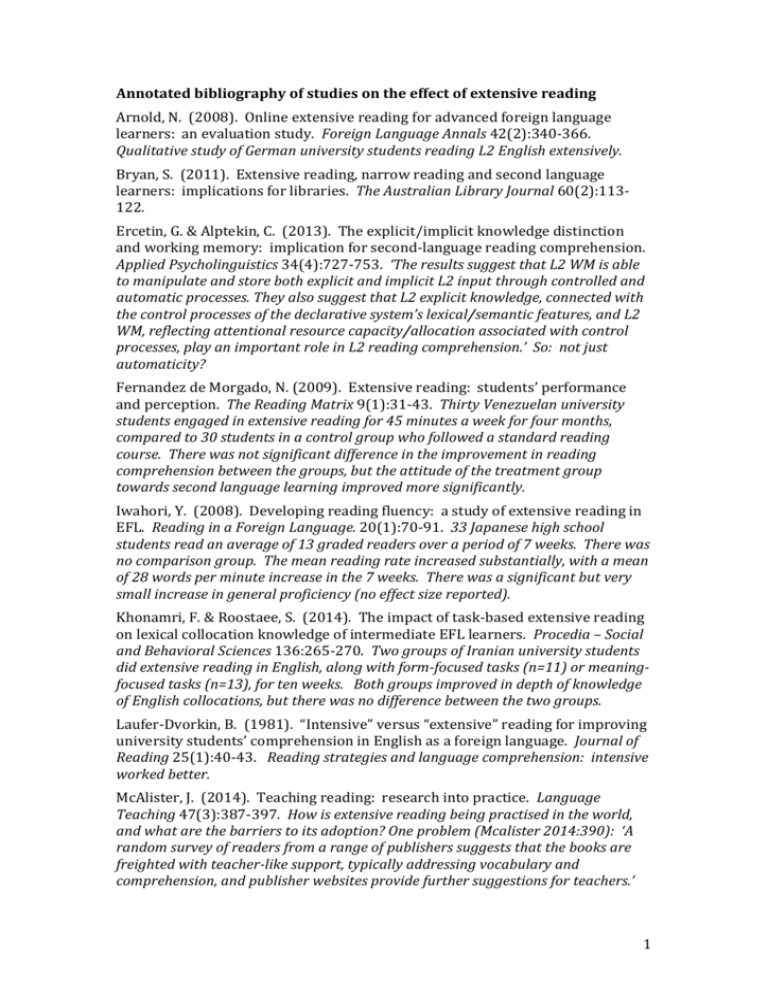
Annotated bibliography of studies on the effect of extensive reading Arnold, N. (2008). Online extensive reading for advanced foreign language learners: an evaluation study. Foreign Language Annals 42(2):340-366. Qualitative study of German university students reading L2 English extensively. Bryan, S. (2011). Extensive reading, narrow reading and second language learners: implications for libraries. The Australian Library Journal 60(2):113122. Ercetin, G. & Alptekin, C. (2013). The explicit/implicit knowledge distinction and working memory: implication for second-language reading comprehension. Applied Psycholinguistics 34(4):727-753. ‘The results suggest that L2 WM is able to manipulate and store both explicit and implicit L2 input through controlled and automatic processes. They also suggest that L2 explicit knowledge, connected with the control processes of the declarative system’s lexical/semantic features, and L2 WM, reflecting attentional resource capacity/allocation associated with control processes, play an important role in L2 reading comprehension.’ So: not just automaticity? Fernandez de Morgado, N. (2009). Extensive reading: students’ performance and perception. The Reading Matrix 9(1):31-43. Thirty Venezuelan university students engaged in extensive reading for 45 minutes a week for four months, compared to 30 students in a control group who followed a standard reading course. There was not significant difference in the improvement in reading comprehension between the groups, but the attitude of the treatment group towards second language learning improved more significantly. Iwahori, Y. (2008). Developing reading fluency: a study of extensive reading in EFL. Reading in a Foreign Language. 20(1):70-91. 33 Japanese high school students read an average of 13 graded readers over a period of 7 weeks. There was no comparison group. The mean reading rate increased substantially, with a mean of 28 words per minute increase in the 7 weeks. There was a significant but very small increase in general proficiency (no effect size reported). Khonamri, F. & Roostaee, S. (2014). The impact of task-based extensive reading on lexical collocation knowledge of intermediate EFL learners. Procedia – Social and Behavioral Sciences 136:265-270. Two groups of Iranian university students did extensive reading in English, along with form-focused tasks (n=11) or meaningfocused tasks (n=13), for ten weeks. Both groups improved in depth of knowledge of English collocations, but there was no difference between the two groups. Laufer-Dvorkin, B. (1981). “Intensive” versus “extensive” reading for improving university students’ comprehension in English as a foreign language. Journal of Reading 25(1):40-43. Reading strategies and language comprehension: intensive worked better. McAlister, J. (2014). Teaching reading: research into practice. Language Teaching 47(3):387-397. How is extensive reading being practised in the world, and what are the barriers to its adoption? One problem (Mcalister 2014:390): ‘A random survey of readers from a range of publishers suggests that the books are freighted with teacher-like support, typically addressing vocabulary and comprehension, and publisher websites provide further suggestions for teachers.’ 1 Nishizawa, H., Yoshioka, T. & Fukada, M. (2010) The impact of a 4-year extensive reading program. JALT 2009 Conference Proceedings. Cited in Mcalister (2014). The authors suggest that reading well below the learners’ current level is more beneficial. Song, J. & Sardegna, V. C. (2014). EFL learners’ incidental acquisition of English prepositions through enhanced extensive reading instruction. RELC Journal 45(1):67-84. Twelve third-year Korean secondary school students engaged in extensive reading plus meaning-based output activities in addition to their regular classes for twice a week for 1.5 hours for one semester. Compared to a control group with no additional tuition, the participants recognised incorrect English prepositions more accurately, but did not produce them more accurately. Taguchi, E., Gorsuch, G. J. & Sasamoto, E. (2006). Developing second and foreign language reading fluency and its effect on comprehension: a missing link. The Reading Matrix 6(2):1-18. Is reading fluency a by-product of reading skills development or a requirement for reading skills development? This article examines theoretical and pedagogical aspects of L2 reading fluency. Tanaka, H. & Stapleton, P. (2007). Increasing reading input in Japanese High School EFL classrooms: an empirical study exploring the efficacy of extensive reading. The Reading Matrix 7(1), 115-131. Japanese high school students (n=96) studying English read assigned passages outside the classroom and spent five minutes per class on some follow-up activities (teacher reading of the assigned passage plus comprehension questions twice a week for 19 weeks). They were also encouraged to read graded readers outside class and 18 students out of 96 did so, reading an average of 3.8 books. Compared to 94 students in a control group who followed the same textbook as the treatment group. The reading comprehension and reading speed of the treatment group improved more than that of the control group, and this difference was attributable to those participants who reported reading graded readers outside class. Of course the participants who read graded readers had more exposure to English than other participants. Walczyk, J. J. & Griffith-Ross, D. A. (2007). How important is reading skill fluency for comprehension. The Reading Teacher 60(6):560-569. (L1) Yamashita, J. (2008). Extensive reading and development of different aspects of L2 proficiency. System 36(4):661-672. 11-week extensive reading programme, n=31, Japanese university students. ‘It is highly probable that certain kinds of abilities/skills improve more quickly than others. Such differences in development may be influenced by learners’ backgrounds (e.g. age, levels of L1 literacy, levels of L2 proficiency). Insights into the differential impact would provide important information for teachers and learners, particularly when the time for extensive reading instruction is limited. Extensive reading may have an overall beneficial effect on L2 acquisition in the long term, but it might be too ambitious to expect that all skills would show equal improvement over a limited period of time.’ (p. 663). Results: significant improvement in reading ability, but not in L2 linguistic ability. 2
